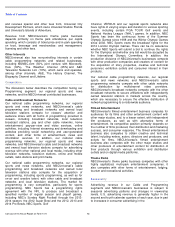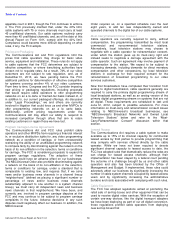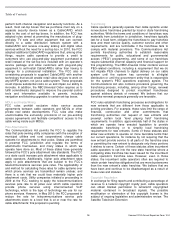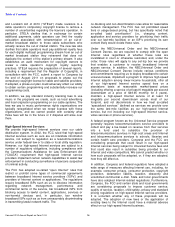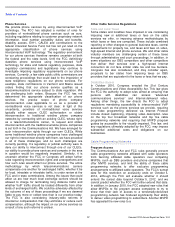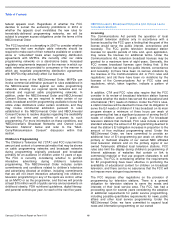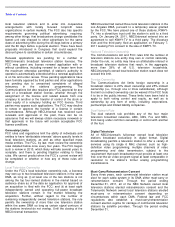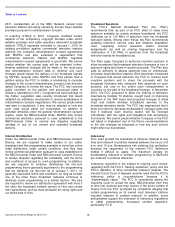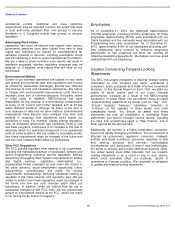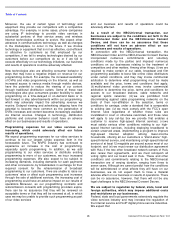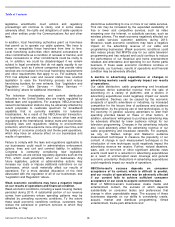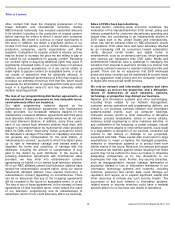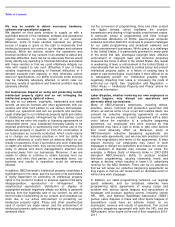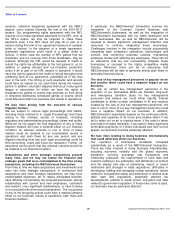Comcast 2010 Annual Report Download - page 25
Download and view the complete annual report
Please find page 25 of the 2010 Comcast annual report below. You can navigate through the pages in the report by either clicking on the pages listed below, or by using the keyword search tool below to find specific information within the annual report.
Table of Contents
Comcast 2010 Annual Report on Form 10-K
20
2011, substantially all of the NBC Network owned local
television stations are being carried by the two major satellite
providers pursuant to retransmission consent.
In enacting STELA in 2010, Congress modified certain
aspects of the compulsory copyright licenses under which
satellite providers and cable operators retransmit broadcast
stations. STELA expressly extended to January 1, 2015 an
existing prohibition against commercial television stations
entering into exclusive retransmission consent agreements
with MVPDs and also extended a requirement that
commercial television stations and MVPDs negotiate
retransmission consent agreements in good faith. We cannot
predict whether the sunset date will be extended further,
whether additional changes will be made to the must
-carry
and retransmission consent laws or whether any such
changes would impact the delivery of our broadcast signals
by MVPDs. Several other MVPDs and third parties filed a
petition asking the FCC to initiate a rulemaking to consider
changes to the current retransmission consent rules and also
asked Congress to review the issue. The FCC has received
public comment on the petition and announced plans to
initiate a rulemaking in 2011. Congress has held hearings on
the matter. Legislation was recently introduced that would
establish an arbitration mechanism to resolve breakdowns in
retransmission consent negotiations. We cannot predict what
new laws or regulations, if any, may be adopted or how any
such rules would affect our businesses. In addition to
potential remedies under the general retransmission consent
regime, under the NBCUniversal Order, MVPDs may invoke
commercial arbitration pursuant to rules established in the
NBCUniversal Order to resolve any disputes regarding
carriage of any of our owned and operated broadcast
stations.
Internet Distribution
Under the NBCUniversal Order and NBCUniversal Consent
Decree, we are required to make certain of our cable,
broadcast and film programming available to bona fide online
video distributors under certain conditions, and they may
invoke commercial arbitration pursuant to rules established in
the NBCUniversal Order and NBCUniversal Consent Decree
to resolve disputes regarding the availability, and the terms
and conditions of access to, such programming. In addition,
we are required to continue distributing via nbc.com
programming that is generally equivalent to the programming
that we distribute via nbc.com as of January 1, 2011, on
generally equivalent terms and conditions, so long as at least
one of the other major broadcast networks continues to
distribute some programming in a similar fashion. We also
are required to renew our distribution agreement with Hulu if
the other two broadcast network owners of Hulu also renew
their agreements, and we must relinquish all voting rights and
our board seat in Hulu.
Broadcast Spectrum
The FCC’s National Broadband Plan (the “Plan”)
recommends that, as part of an FCC effort to make more
spectrum available for mobile wireless broadband, the FCC
reallocate up to 120 MHz of spectrum from the broadcast
television bands. Among other things, the Plan recommends
updating television service area and distance separation
rules, repacking current television station channel
assignments (as well as sharing frequencies) and the
reallocation of 120 MHz of spectrum from the broadcast
television bands for broadband use.
The Plan urges Congress to authorize incentive auctions to
allow incumbents like broadcast television licensees to turn in
spectrum rights and share in auction proceeds. The Plan also
calls for authority to assess spectrum fees on commercial,
full-power local television stations. Bills have been introduced
in Congress that would authorize the FCC to conduct such
incentive auctions and to share the proceeds with the
broadcast licensees who relinquish their spectrum for such
auctions, but only to the extent such relinquishment is
voluntary on the part of the broadcast licensee. In November
2010, the FCC proposed to allow the sharing of television
channels by multiple TV stations, sought input on improving
reception in the VHF band and proposed changes to allow
fixed and mobile wireless broadband services in the
broadcast television bands. The FCC has emphasized that it
does not intend to decrease broadcasters’ carriage rights and
that it believes each sharing station will be licensed
individually, with the rights and obligations that accompany
that license. We cannot predict whether Congress or the FCC
will adopt or implement any of the Plan
’s recommendations
or the rule changes as proposed or how any such actions
might affect our businesses.
Indecency
FCC rules prohibit the broadcast of obscene material at any
time and indecent or profane material between the hours of 6
a.m. and 10 p.m. Broadcasters risk violating this prohibition
because the vagueness of the relevant FCC definitions
makes it difficult to apply. The maximum penalty for
broadcasting indecent or profane programming is $325,000
per indecent or profane utterance.
Indecency regulation is the subject of ongoing court review,
regarding both the FCC’s “fleeting expletives” policy and the
FCC’s definition of what constitutes indecent material. The
Second Circuit Court of Appeals recently ruled that the FCC’s
indecency policy is unconstitutional because it is
“impermissibly vague.” The FCC is considering asking the
Supreme Court to review the case. NBCUniversal from time
to time has received and may receive in the future Letters of
Inquiry from the FCC prompted by complaints alleging that
certain programming on its owned local television stations
included indecent or profane material. In addition, some
policymakers support the extension of indecency regulations
to cable programming. Increased content regulation,
particularly if it is



